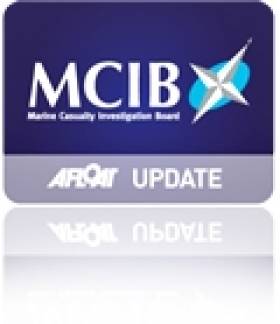Displaying items by tag: Jonathan O'Donnell
Neglect of Safety Procedures Led To Leg Injury on Fishing Vessel - MCIB
#MCIB - The dangers of performing maintenance tasks on boats while machinery is running have been highlighted in the official investigation into an accident on a fishing vessel off Erris Head in Co Mayo last year.
The skipper of the MFV James Collins was seriously injured when his leg was caught in the vessel's propeller shaft while attempting to clear debris from the bilge pump on the morning of 20 April 2012.
Jonathan O'Donnell, aged 26 at the time, suffered significant soft tissue damage to his left leg and broke his trivia, fibia and ankle in the incident. Luckily the leg did not require amputation and he is expected to make a full recovery.
The report into the incident by the Marine Casualty Investigation Board (MCIB) found that the vessel's bilge pump was located in the hold adjacent to the propeller shaft, with access to both prevented by the same covering boards.
When O'Donnell responded to a persistent bilge alarm, he did not put the engine on stop or into neutral and the propeller shaft remained turning when he removed the covering boards to access the pump.
As he put his foot into the bilge beside the shaft in order to reach down and clear debris, his waterproof leggings were caught by the coupling on the shaft and his leg was round around it twice.
The MCIB noted the quick actions of the vessel's crew and the prompt attendance of RNLI lifeboat and Irish Coast Guard helicopter crews as instrumental in O'Donnell receiving swift treatment and not losing his leg.
However, the report also pointed to a lack of attention to proper safety precautions on board, nothing that the skipper was "too intent on solving the bilge pump problem" and that he "neglected basic safety procedures" by not stopping all machinery before accessing the bilge as set out in the Code of Practice for Fishing Vessels.
The report concluded that the "ease with which debris could enter the bilge and block the pump suction" was a contributing factor to putting the skipper in his predicament at the time, and also referenced the ease with which loose-fitting clothing like waterproofs can be snagged on turning machinery.
Moreover, the screening of the propeller shaft by covering boards also used to access the bilge pump did not present adequate protection "enabling it to be easily exposed and present a hazard".
The MCIB recommends that the Code of Practice be amended to highlight the danger of accessing the bilge area when shafts are rotating, and to include assessment of sole boards in fish holds to prevent debris passing through to the bilge tank. The complete report is available to download below.






























































